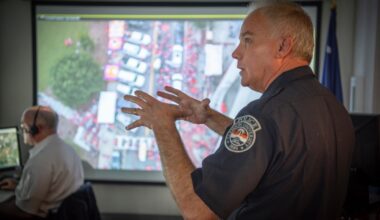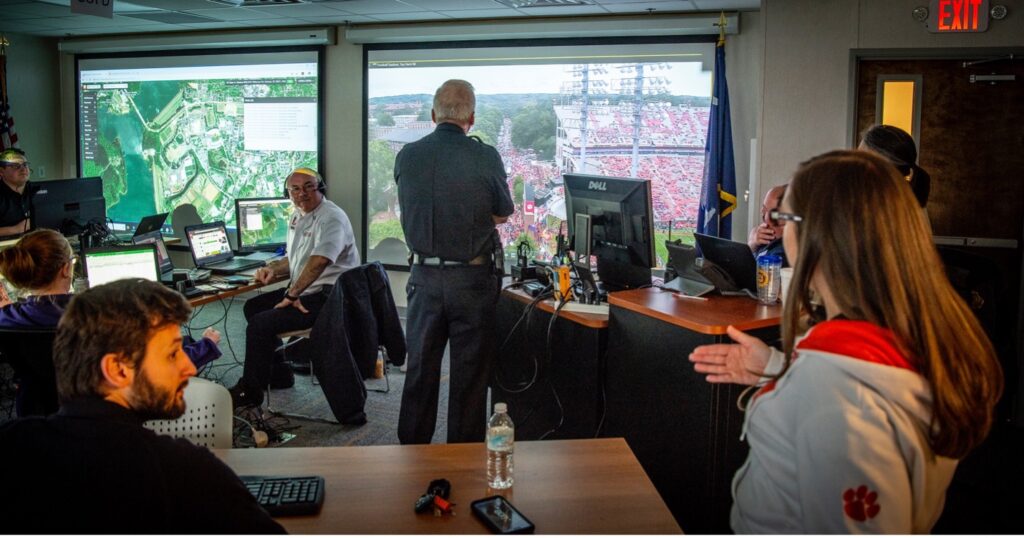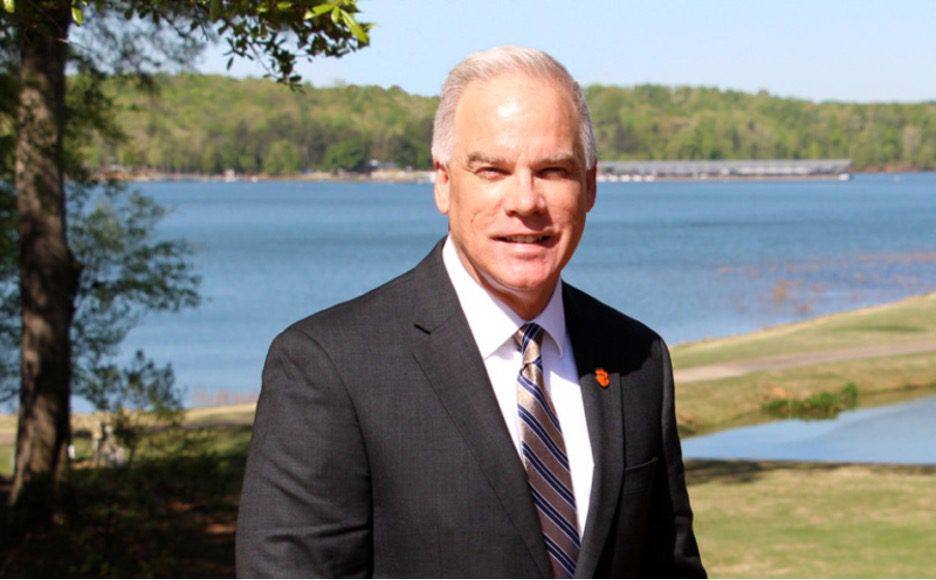Clemson University’s Associate Vice President for Public Safety and Chief of Police Greg Mullen has announced his upcoming retirement. Having benefited from Chief Mullen’s leadership experiences for the past six years, Clemson will use a search firm and a search committee chaired by Associate Vice President and Chief Ethics and Compliance Officer Tracy Arwood to conduct a national search to find an associate vice president for public safety who will then lead a national search to find the University’s next chief of police.
Chief Mullen has always had a clear vision and mission – to protect and serve. He is an incredible leader in our community, and through his dedication and commitment, Clemson University continues to be recognized on a national level for our campus safety and security. We are thankful for Chief Mullen’s years of service at Clemson and wish him the best in his retirement.
CLEMSON UNIVERSITY PRESIDENT JIM CLEMENTS
Mullen’s Leadership Legacy
Building a safer Clemson University community has truly been a team effort, according to Mullen. The significant public safety improvements once only envisioned by Mullen garnered the support and developmental funding of University leaders to become a reality. Because of that leadership support and the efforts of the strong teams Mullen built around him, the University benefitted from transformational safety changes in the last six years highlighted in this article.
Clemson University Police Department earned the gold standard in public safety, as an accredited agency by the National Commission on Accreditation for Law Enforcement Agencies, Inc. (CALEA). Only 4 percent of law enforcement agencies in the United States have attained this accreditation status. CUPD first achieved CALEA accreditation in 2021, signifying the Department delivers on its public safety mission at a standard only a few national law enforcement agencies are fortunate enough to achieve.

The importance of emergency planning, preparation and exercise led to the strengthening of the emergency management function. The core Emergency Management team grew from one full-time person to six full-time people, the Emergency Management Council expanded its role and the development of the Emergency Operations Center has demonstrated its value during several significant incidents.
Clemson University Fire Department enhanced operations as well. Staffing increased to meet NFPA standards, specialized units updated equipment and training, response apparatus was updated and increased and technology advanced to improve unit deployment, incident tracking and the community’s ability to share critical information with responders.
Yet another example of improvements has been gameday operations. A regular home game can bring 80,000 fans to the stadium and 100,000 to the campus area. Since 2019, Mullen partnered with athletics and others to continually enhance safety protocols, including the establishment of secure perimeters around Memorial Stadium, the implementation of magnetometers at all gates, enhanced onsite medical services and other crowd management processes.

Mullen has also focused on improving the capabilities of first responders since arriving at Clemson. From radio system upgrades, emergency management software, in-car and body worn camera streaming capability to enhance situational awareness during emergencies response, technical rescue capabilities, personal protective gear and more, his teams have worked closely together to connect their operations in a manner that optimize services.
Mullen’s teams have also worked to enhance the use of technology. Starting with a system of 900 dispersed cameras, they built a centralized system of more than 1500 cameras providing over 4000 views across campus. They managed the installation and management of an access control system spanning most buildings on main campus and many innovation campuses. In 2023, this system expanded to include connected lock down devices protecting classrooms and alerting first responders of potential active violence incidents. Technology is a passive capability without human engagement, so in 2019 Mullen implemented the Physical Security Operations Center to transition this investment into an active part of public safety operations. Staffed 24/7 daily, security specialist assists police, fire and special event response by providing real time information to responders and serves as force multipliers by proactively monitoring activities around campus.
Mullen demonstrated a passion for helping those in crisis. He implemented national programs to provide responders will skills to deescalate situations and obtained grants to expand training and response strategies dealing with mental health crisis. Beginning in 2019, he and his team worked with Clemson researchers and other partners to obtain a Bureau of Justice Assistance grant to provide mental health training to law enforcement officers and develop a strategic roadmap for mental health crisis responses; in 2022, a second grant was received to further enhance this effort. A 3-year grant, in partnership with the SC department of Mental Health will pair mental health clinicians with police officers to create co-responder teams. This will provide immediate intervention to those struggling with mental and emotional crisis.
Building partnerships and community support has been a cornerstone of Mullen’s time at Clemson. Whether engaging with the campus population via police, fire and emergency management prevention efforts, supporting community youth enrichment programs, working with student and community groups to safely engage in special events across campus or expanding transparency and communication about public safety operations, he has developed relationships supporting Clemson efforts to create a safe and secure learning environment for all.
Amazingly, almost three years of Mullen’s career at Clemson included leading the University’s response to COVID-19. The University’s COVID-response teams processed more than one million COVID tests on campus and maintained unparalleled low infection rates—much thanks to the leadership of Mullen and many others.
Chief Mullen has taken the safety and wellbeing of Clemson’s students, faculty and staff to an entirely new level during his tenure these past six years. Out of all the many images of Greg’s leadership over his time at Clemson, one is fixed in my mind. That singular image is Chief Mullen standing day after day, leading in his calming way, the University’s coordinated response that was critical to helping the University provide a coordinated, positive response to COVID-19.
EXECUTIVE VICE PRESIDENT AND CHIEF OPERATING OFFICER TONY WAGNER
Mullen’s Career Prior to Clemson
Prior to arriving to serve at Clemson, Chief Mullen had retired as chief of the Charleston Police Department. In 2018, he arrived at campus with 30 years of experience in law enforcement, including 11 as Charleston chief. While chief of police in Charleston, his department had implemented innovative programs addressing intimate partner and family violence. The department had also built important community partnerships and invested in technology.
Shaped by his experiences of responding to events such as the Emmanuel AME Church shootings in 2015 and the Sofa Super Store fire of 2007, Mullen learned how important it was to create solid, reliable trust relationships within the community and his colleagues.
Earlier in his career, Mullen had worked at the Virginia Beach Police Department as an officer, becoming deputy chief in 2002.
Mullen is also a U.S. Air Force veteran with a combination of 22 years of active and reserve service.
Get in touch and we will connect you with the author or another expert.
Or email us at news@clemson.edu

